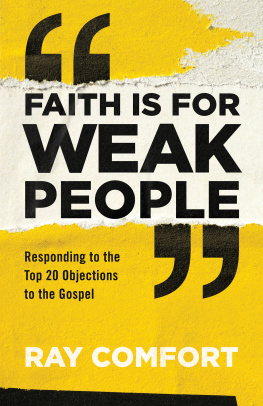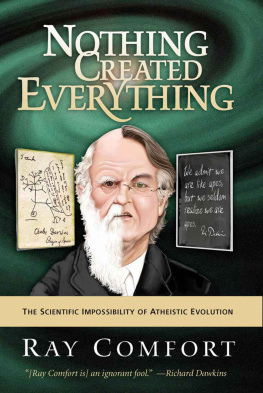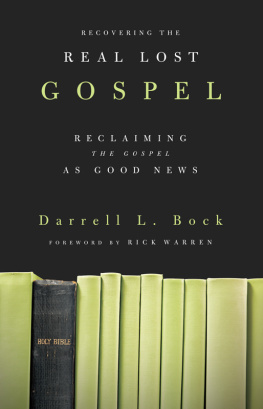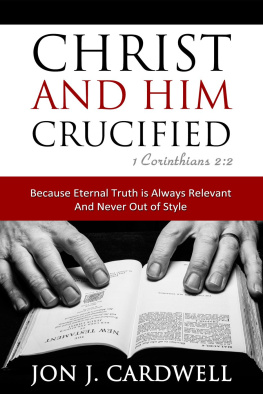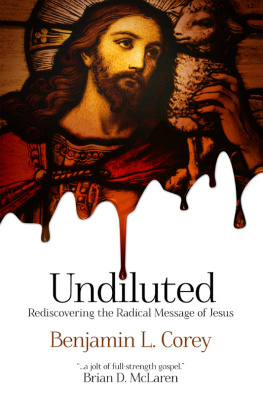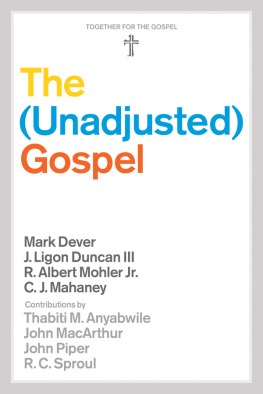
God Has a Wonderful Plan for Your Life:
The Myth of the Modern Message
Living Waters Publications
P.O. Box 1172
Bellflower, CA 90707, USA
www.livingwaters.com
2010 by Ray Comfort. All rights reserved. No part of this publication may be reproduced, stored in a retrieval system, or transmitted by any meanselectronic, mechanical, photographic (photocopying), recording, or otherwisewithout prior permission in writing from the publisher.
Edited by Lynn Copeland
Cover, page design, and production by Genesis Group
Cover illustration by Gustave Dor, The Dor Bible Illustrations, Dover Publications, Inc.; modified by Dale Jackson
Printed in the United States of America
ISBN 978-1-878859-49-5
eISBN: 9781878859020
Unless otherwise indicated, Scripture quotations are from the New King James version, 1979, 1980, 1982 by Thomas Nelson Inc., Publishers, Nashville, Tennessee.
Scripture quotations designated AMP are from The Amplified Bible, 1958, 1987 by The Lockman Foundation, La Habra, California.
Scripture quotations designated TLB are from The Living Bible, 1971 by Tyndale House Publishers, Inc., Wheaton, Illinois.
Scripture references designated KJV are from the King James Version.
Unless otherwise noted, emphasis within Scriptures and other quotations has been added by the author.
O ne cannot fully understand what one is saved to unless one also understands what one is saved from. We are saved from the consequences of our sins, which is hell. Jesus said, If your hand causes you to stumble, cut it off; it is better for you to enter life crippled, than, having your two hands, to go into hell, into the unquenchable fire (Mark 9:43). It was with the knowledge of hell that Jesus graciously and lovingly called people to repent of their sins and to trust him as Lord and Savior. He thus began his public ministry proclaiming, The time is fulfilled, and the kingdom of God is at hand; repent and believe in the gospel (Mark 1:15).
It is an unfortunate commentary, but we are living in a day when the saving message of Jesus Christ is being lost in our churches. Replacing it is a new set of concerns that are quick to speak of Gods love, mercy, and grace, but are slow to take up the implications of His holiness, judgment, and wrath. Being disturbingly silent on the significant issues of sin and judgment to come, much contemporary evangelism is producing a bumper-crop of unregenerate believers.
The erosion of gospel values first came to my attention years ago as a young proclamation evangelist in Connecticut. I was shocked to discover the extent to which the softer, gentler vision of God, heralded by the early nineteenth-century Universalist William Ellery Channing, continued to inoculate scores of New England churches to the Christ of the Bible.
Years later, I served Dr. Bill Bright as his theological editor, and was privileged to work with him for seven years. Dr. Bright was well aware of the dangers awaiting the unconverted. Toward the end of his life, his great trepidation for the lost led him to author two additional books: one on the Ten Commandments, and another on the vital subjects of heaven and hell. I was delighted that he was addressing such important topics. The hours I spent editing those two books further solidified in my heart the importance for people to be exposed to the genuine gospel of Jesus Christ.
About the same time, I discovered the evangelism of Ray Comfort. Upon watching his videos, which include Kirk Cameron, it became clear to me that Ray had his finger on the problem. He had made a monumental advance in reclaiming the evangelall of which he had condensed in an exciting and easy-to-learn approach called The Way of the Master.
Once I became the pastor of a church, I couldnt wait to implement Rays materials. So far, I have been privileged to lead our people in several training sessions of The Way of the Master. The results have been nothing short of remarkable. Not only have trainees developed a greater understanding of the gospel, and a love for the lost, but also we have exposed scores of people to the gospel with the result that many have become Christians. I am also encouraged that some of these new believers have joined our church and are now active participants.
There are many ways to articulate the gospel. But before you begin chapter one of this book, let me ask you to set aside any preconceived thoughts you have about personal evangelism and judge everything you read according to the Scriptures. I believe that you will find here an approach that takes its cue from the very way Jesus of Nazareth called people to the family of God.
JOHN BARBER, PH.D.
W e live in exciting times. All around us we are seeing the phenomenal rise of megachurches with congregations in the tens of thousands; pockets of revival have sprung up in the United States and other parts of the world; and we have heard of millions of people in Russia, China, and Africa coming to the Savior.
One evangelist, for example, claims that his worldwide tour has led nearly 1 million people to make decisions for Christ since 2007.
These are indeed exciting times.
Yet, with all the excitement about the growth of the contemporary Church, it seems that many have overlooked a few statistical inconsistencies. Before we look at these, I am reminded of a doctor who said to his patient, I have some very bad news for you. Your heart is extremely weak, and any bad news could kill you. So, how is your heart? I have some really bad news for you. As you hear it, please be consoled that there is a cure.
An October 2003 survey conducted by the Barna Group found that 45 percent of those who profess to be born-again Christians believed that gambling was morally acceptable. According to the survey, 49 percent believed that living with someone of the opposite sex without being married was morally okay. Just under half of those questioned (49 percent) were comfortable with enjoying sexual thoughts or fantasies about someone, while one-third (33 percent) of those professing to be born again thought that it was okay to kill a baby while it is still in the womb.
In 2001, a survey conducted by the Alan Guttmacher Institute in New York found that 13 percent of abortion patients describe themselves as born-again or evangelical Christians. That is, of all those who actually murdered their own unborn children, nearly one in eight professed faith in Jesus Christ. That is difficult to reconcile with the fact that Christians are supposed to love God and love others as much as they love themselves.
Additionally, according to an article titled Porn Nation in World Magazine, of the men belonging to the Christian organization Promise Keepers (who make a promise to be committed to practicing spiritual, moral, ethical, and sexual purity), 53 percent visit porn sites every week. This is despite the fact that these men are to be the spiritual leaders of their flocks and their families.
In 2009, the Barna Group found further evidence that all is not well in the contemporary Church:
Among individuals who describe themselves as Christian, for instance, close to half believe that Satan does not exist, one-third contend that Jesus sinned while He was on earth, two-fifths say they do not have a responsibility to share the Christian faith with others, and one-quarter dismiss the idea that the Bible is accurate in all of the principles it teaches.
Think for a moment of the implications of such a theology. Here we have millions of believers who supposedly confess that Jesus is Lord, and yet they think He sinned. They either dont know what the Bible teaches about the Son of God or they believe it is inaccurate when it says that Jesus knew no sin (2 Corinthians 5:21), that He was in all points tempted as we are, yet without sin (Hebrews 4:15), and that He committed no sin, nor was deceit found in His mouth (1 Peter 2:22). Furthermore, if Jesus sinned, it would mean that He was not the spotless Lamb of God the Scriptures say He was (see 1 Peter 1:19); that His sacrifice was not perfect; and that when God accepted Jesus death as an atonement for our sins, He sanctioned a contaminated payment and is therefore corrupt by nature. Sadly, the multitudes who profess faith in Jesus, yet deny His sinless perfection, appear to be strangers to true regeneration. The Jesus they believe in isnt capable of saving anyone.
Next page




